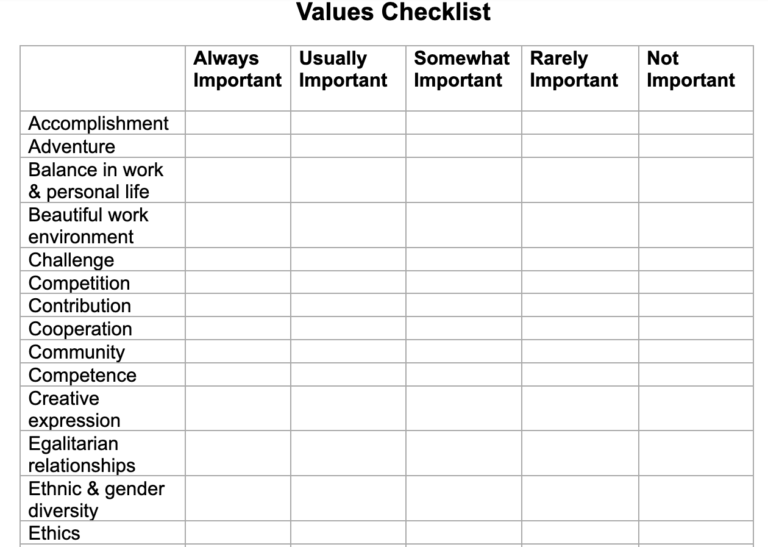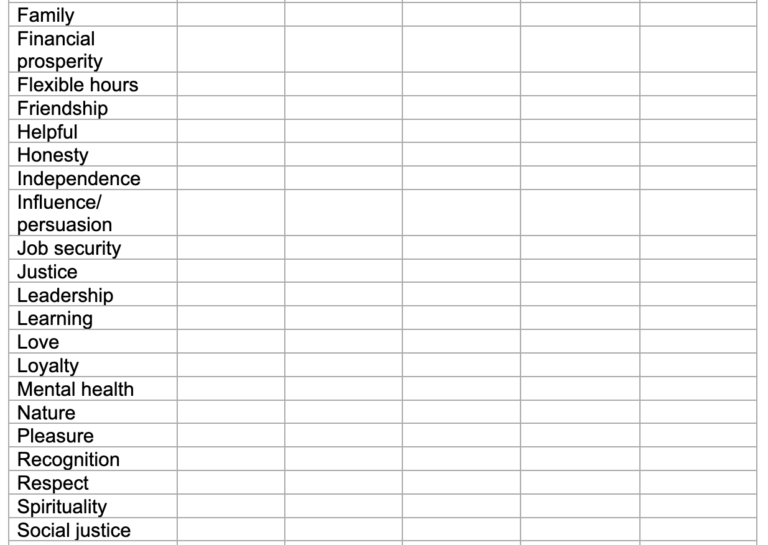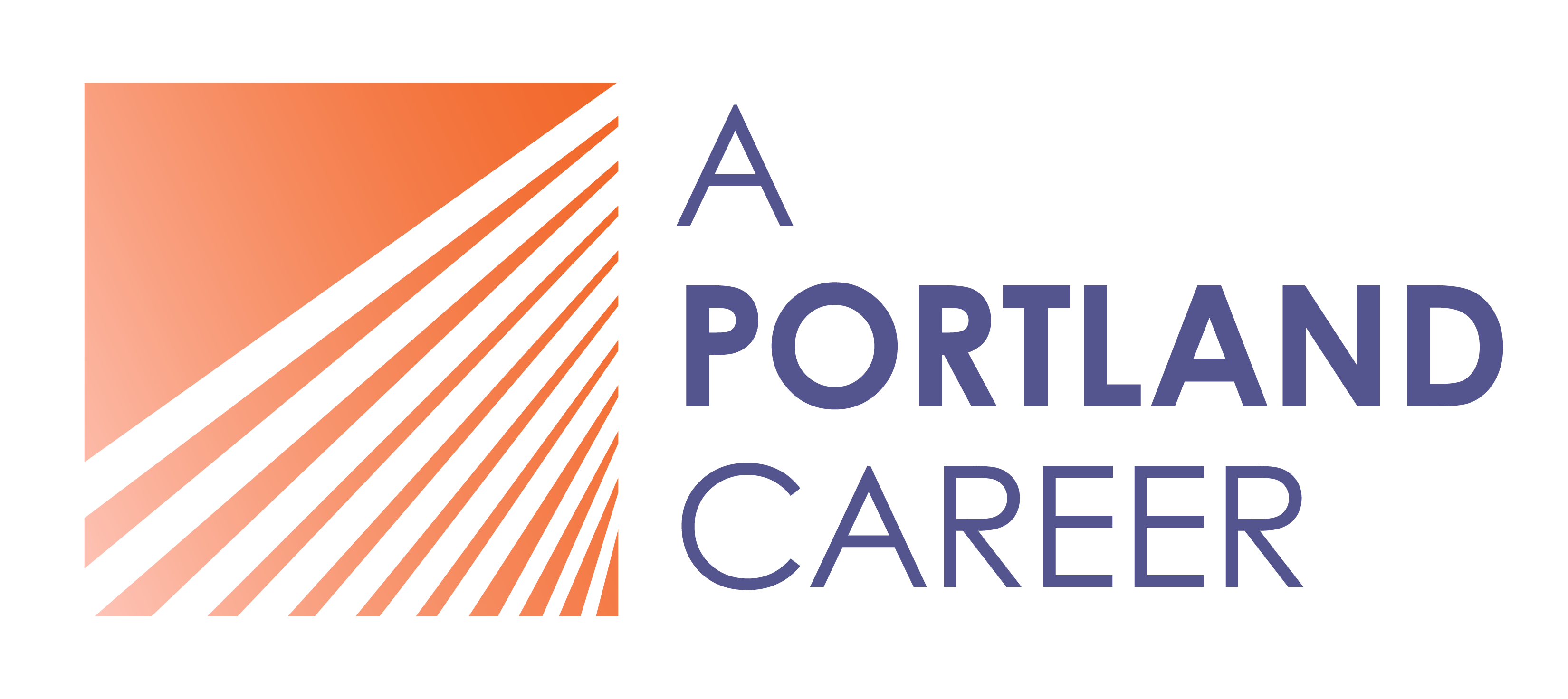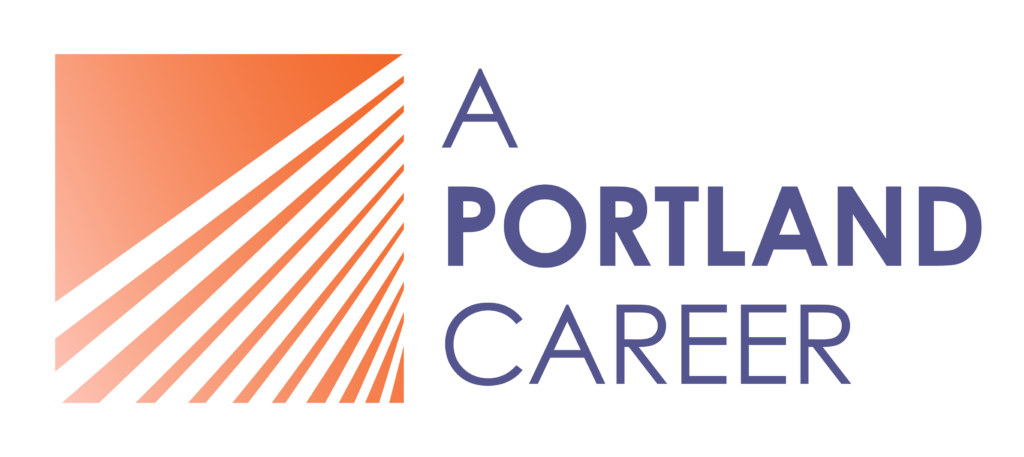Decide whether you should pursue a practical career or a passionate calling with our career interest assessment.
So often, our careers seem to be at odds with our core values. This career values exercise gives you permission to think outside the cubicle and find work you love!
Your Career Values Assessment
By A Portland Career, and edited by Suzie Sherman and JD Duran
Experiencing career burnout? We can help you explore a more meaningful career path

Too often, we enter a job search or a career exploration with our nose to the ground, thinking only of what’s most practical and expedient in landing a job that will make ends meet. But sometimes, after years of training or higher education in a particular field, we might realize, for example, “I don’t actually want to be a QA tester anymore,” and this realization can lead us to an exploration of our own deeply held values, changing our career path, if we let it. This article gives you a way to articulate your core values and translate them into career values that can guide you to greater professional development and more job satisfaction.
Our career identities need to resonate with our deepest values. We feel at peace with ourselves emotionally, and spiritually, if you will, when we spend our days at home and at work in congruence with those values. Even in subsistence jobs, where the paycheck is the biggest motivator, we have the opportunity to express our very human, core values in the way we care about our work, in the way we treat our work relationships, in the attention we give to our professional development, and to the growth of others.
Some of your deep values may have been with you throughout your life, hardwired, as it were, or shaped by your cultural context. Or maybe some of your values are changing with more experience in your career path over time.
In this self-assessment, you will identify what you value most in your personal life as well as values that are essential to your job satisfaction. Certainly, you’ve found that you have to balance job security with the lifestyle values you most ideally want.
But maybe you’re looking for greater meaning in your work, a more vibrant or comfortable work environment, or more opportunities for career development. Let’s find out how to bridge our core values with our work values.
Home → Helpful Articles → Career Exploration → Your Career Values Assessment
Your values, interests, and passions are an important part of your career exploration. Here are some great posts to help think about what’s meaningful for you:
- Getting Clear on Your Career Path: Discerning Your Interests and Passions
- How to Decide on a Career Path
- Your Career Exploration Brainstorm: Deepen your Search!
- Taking Your Skills Inventory: Self-Assessment Time
- Big Five Personality Traits
- What Does Your MBTI Personality Type Actually Mean for Your Career?
If you’re feeling stuck, get in touch, and we’ll help you assess your skills, passions, and financial needs to find a great new career path.

Prepare for the career values assessment
Client spotlight: Susan
Susan grew up enthralled with her grandfather, the president of a college; her mom was a librarian. Family dinners, where everyone shared what they had learned, formed her best memories. Her love of learning was unshakable. Therefore, after assessing her career values, Susan decided that she would only consider careers where professional development and learning challenges are important work values.
Take a look at the Values Checklist. You may have a clear, deep, even visceral response concerning some of the personal values listed there: “Yes, that is clearly what drives me.” It may be more confusing to identify which values are also vital to your career choices.
To help you clarify the types of career values you want to deploy in your job search, you may want to grab a cup of coffee or a journal and ask yourself the hard questions:
- “At this stage of my life, is financial prosperity, or rising to the top, an intrinsic career value for me, or an extrinsic value because of my family background, or because of my material needs?”
- “Can my concern for social justice and equity be met through work, or do I have to prioritize this through volunteering or community organizing?”
- “Am I ready to own that I value competence and accomplishment more than I did earlier in my life, or more than my friends do?”
- “Can my need for creativity be met through creative problem solving or is the core value to make something of beauty?”

Assess Your Values
Client spotlight: Kristin
While finishing college in her early 20s, Kristin went through a divorce of her first, very youthful, marriage. Though she and her husband tried to make it work, it was crystal clear within months that they wanted different things from their lives, their careers and—most importantly—their futures. As they struggled to end things as maturely as possible, she was plagued by a nagging sense that she would never believe in her ability to make good choices again, either in the type of relationships she wanted, or in her broader life and personal work values.
Luckily, that stressful last semester, she took a class she deemed an easy A—”Recreation & Leisure Studies.” She thought, “how hard could that be?” Little did she know the class would lead to a self-reflection that kicked her butt and helped her regain confidence in her decision-making skills.
To her surprise, the rec instructor turned out to be soulful and introspective. The students were expected to dig deep into their emotions, reflect on the past, contemplate their future, and analyze their core values.
Their assignment was to choose 20 values out of long list, then narrow that list to 10, and finally—this was the hard part—prioritize these values. Next, the instructor asked the students to write a paragraph about each value and how it would influence their life in the next five years.
It was one of those assignments that on the surface seemed simple, but was actually one of the most difficult assignments of Kristin’s academic career. She happened to be going through a time when her core values felt uncertain. As she was about to graduate from college, she realized it was time to decide not just who she was in the aftermath of her divorce, but who she wanted to be going forward as her own person.
As you may have gathered from Kristin’s story, this is a powerful exercise, and we think it translates to some solid career advice. Here’s how to do it:
Save the Values Checklist below as a PDF, or print it out. Place an “x” next to each value listed to indicate how important it is to you:
- Always Important
- Usually Important
- Somewhat Important
- Rarely Important or
- Not Important
(Feel free to add values you don’t see listed, as well.)
Narrow or expand the list of Always Important values to 10. If you have less than 10 values that are “Always Important”, look at the values you marked as Usually Important and promote the top ones to Always Important.



Explore your values more deeply
Client spotlight: Jason
Jason was a 39 year old lawyer who came from an east coast professional family. His first career chapter, working in legal defense, was driven by his values of competence and social justice. After some disillusionment and stress-related illness, he took a break to walk the Pacific Coast trail and think about what was really important to him. He decided he needed more time in nature, work-life balance and flexibility. He defined how these new career values would need to play out in his next career very concretely—he wanted “time to hike every weekend and at least three weeks’ vacation every summer.”
Once you’ve identified your top 10 most important values, list them in this next form, and write one to two sentences describing why each of those values is important to you. Give voice to the meaning that these core values have in your life, and how you want to carry them forward for the next year, or five years.
Try doing this exercise once, and then revisit it again in a few days to see what, if anything, has changed.

Take your values into your job search
Now it’s time to apply this values exercise to the more practical aspects of your career path exploration and job search. Keep your values in mind, and let them guide you to the employers or work situations that will feed you on a deeper level than just providing a paycheck.
Allow this process to inform how you approach your job search. What is the ideal work environment to match those values? Think about how each value might look in your career plan, in the kind of workplace you would most like to be a part of. How might your values help you build the kinds of work relationships you would like? How would this play out in your ideal work schedule, or in how much stability versus risk-taking you crave in a job. We recommend reading our article about career brainstorming to take this values exercise further into your search.
Here are some ideas for incorporating this values assessment into your search on a more practical level:
- Research potential employers on the career website Glassdoor.com. The site boasts millions of company reviews by current or former employees, allowing you to find honest assessments of what it’s like to work for a particular company or organization. If you’re curious about a typical workday there, or about the salary range, or about how collaborative the workplace is, Glassdoor is a great place to start.
- List your values on your LinkedIn profile, and connect with mentors and fellow job seekers who have the same values. Follow and interact with the posts of professionals in the fields you’re curious about.
- Express your values in your cover letters. Making a statement about who you are as a person and what you value is a way to make a strong, confident impression on your potential employers.
- Make sure to ask questions in your job interviews about the values of the company you’re applying to. Do they match your own? Would it feel like a core value compromise to work there?
Final thoughts
In this exercise, we hope we’ve given you permission to examine your core values and let them guide you to a more fulfilling career path. By naming your values, prioritizing them, and giving voice to the meaning they have in your life, you are preparing to apply those important values into your decision-making moving forward in your job search. Even when “just a paycheck” has to be the primary motivator, we can still keep our core values at heart, and let them guide our work relationships, our professional development, and the kinds of career choices we make.
Key takeaways
- It’s incredibly important on an emotional, and even spiritual, level, to center our core values in all aspects of our lives, and our career path is one of the most important places to do it.
- Get clear on the intrinsic and extrinsic values that you take into your job search and career exploration. Open yourself to the possibility that your priorities are changing over time as you gain experience in your life and in your work.
- Take the time to name 20, 50, or 100 values (using our assessment to help you) and narrow those values down to the 10 most important values you want to take with you into your career path.
- Even if the current job you’re in, or the job you’re seeking, can’t be a demonstratively a “values-driven” job, you can make room for your core values to guide you in the workplace, and in your life outside of work.
Related articles you might be interested in:
The Big 5 Personality Traits: Get to Know Yourself to Find a Better Career Path
The Big 5 personality model is a tool to help you gain emotional insight about your core personality traits and find the best career match for you!
How to Decide On a Career Path
Deciding on a career path can feel overwhelming, but with clear objectives, solid self-assessment, and a healthy trust of your gut instincts, you can do this thing!
Taking Your Skills Inventory: Self-Assessment Time
Take our skills inventory assessment! Find out which important skills you already have; need to build; and want to use in your next job.





